The two parts of E-E-A-T Google hasn’t told you about
Explore how notability and transparency complement Google E-E-A-T and how to integrate these elements seamlessly into your digital strategy.
In this article, I will expand upon Google’s concept of E-E-A-T by adding “notability” and “transparency.” These additional elements are often overlooked but are crucial for demonstrating credibility to Google.
Notability reflects the impact or recognition in a specific field, while transparency emphasizes openness about who is behind the content or business.
Putting Google to one side, trust is the cornerstone of business success. Customers gravitate toward brands they believe they can trust to effectively solve their problems.
Google’s mission is to guide its users to trustworthy solutions. Experience, expertise, authoritativeness and trustworthiness (E-E-A-T) form a great basis, but credibility also requires notability and transparency.
This article explains how notability and transparency help establish a brand’s trustworthiness and credibility in the eyes of both consumers and Google.
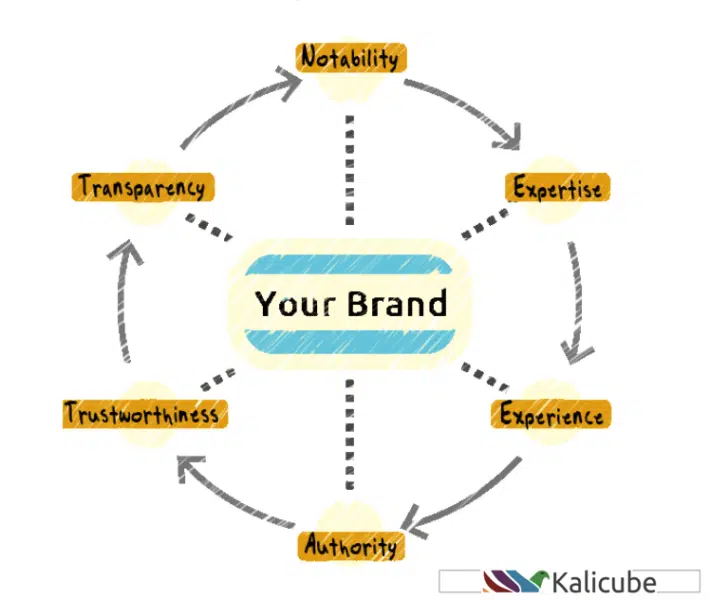
E-E-A-T is a fancy acronym for credibility
Measuring credibility is tough in the best of worlds. On the unbelievably vast and super messy internet, it is impossible.
For the last 25 years, Google has used links. It once seemed super smart and now seems very simplistic. But links are just a popularity signal. Websites have been playing a pure popularity game for as long as Google has existed.
That has changed. We no longer play a website or webpage credibility contest using links as arbiters.
Modern SEO has to win a more complex, more human credibility contest: a subtle evaluation of the combined “human trustability” of the website owner (corporation or person), the content creator (person or corporation) and the content itself.
That sounds very human.
Google’s search quality rater guidelines are very human, and they make this new paradigm abundantly clear – E-E-A-T is mentioned 121 times and page 27 clarifies Google’s focus quite delightfully.

Equally important: in December 2022, they replaced references to “website” with “website owner” 20 times. They increased the number of mentions of content creator (a.k.a. corporation or person who is the author of the content) to 140.

Website owners and content creators are people or corporations (organizations). As humans, we understand these instinctively but Google needs an extra step.
Without entity understanding, E-E-A-T means nothing
If Google cannot explicitly recognize the named entity (i.e., the website owner or content creator), it cannot effectively apply E-E-A-T signals.
Without this understanding, your efforts to build and demonstrate E-E-A-T will be futile because they won’t resonate with Google’s algorithms.
It’s like crediting an artist for a masterpiece without knowing who the artist is. Their reputation and expertise simply can’t be acknowledged or appreciated.
It is clear that in modern SEO, establishing your identity in Google’s Knowledge Graph is a must-have foundation for any E-E-A-T strategy to have real impact on search rankings and online presence.
Knowledge Graph update, March 12, 2024: The number of person entities in Google’s Knowledge Vault increased 17.09%. The number of E-E-A-T-related person entities (researcher, author, writer, journalist, etc.) increased to 34.01%, significantly more than other categories.
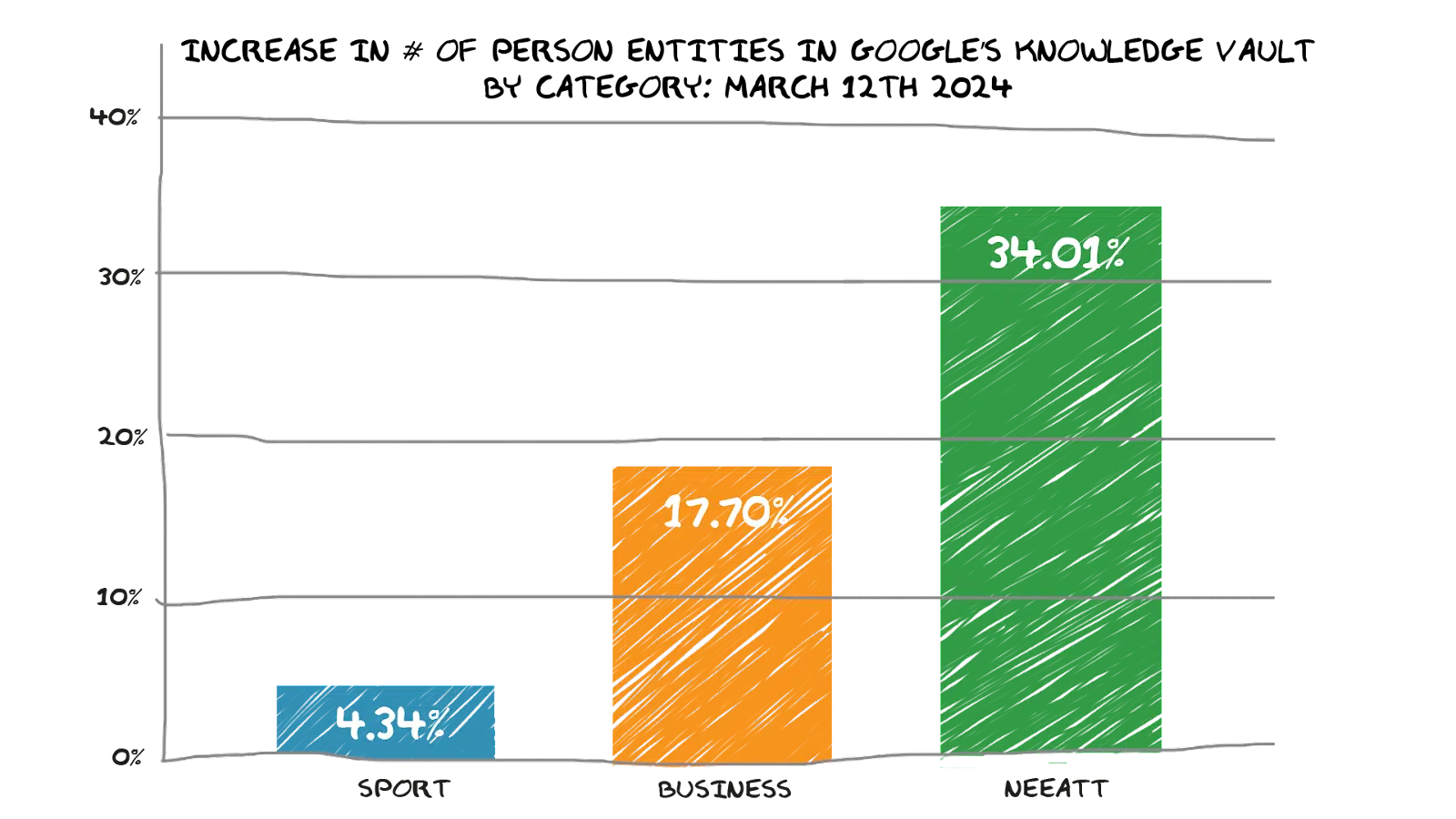
This is a continuation of the Killer Whale update from July 2023 (see “Inside Google’s massive 2023 E-E-A-T Knowledge Graph update“), where Google clearly focused on identifying person entities in the context of E-E-A-T.
Trust is the key to business
People will work with you if they trust you to solve their problems. Google recommends solutions to users’ problems when they search or converse with generative AI, targeting specific audiences when it trusts you to provide the solution.
What is Google trying to do with E-E-A-T credibility?
Google is building its algorithms to evaluate credibility and trust as humans do but with much more information and perfect recall memory.
They aren’t there yet, but that is the target they are aiming at and where they are going. This is an incredibly important point to remember for the rest of this article and the rest of your career in SEO.
Links have historically been a huge focus for SEO. People don’t evaluate trust and credibility by counting links and so Google’s algorithms have been and will continue to let go of links as a signal gradually.
Links will continue to be considered but will become significantly less effective over time as Google improves its ability to apply additional signals to the content, the website owner and the content creator. Entity Optimization for E-E-A-T is a “thing” in modern SEO.
Google representatives have stated multiple times that there isn’t an “E-E-A-T algorithm,” and that makes sense.
Credibility is part and parcel of every element of a business that a human implicitly evaluates before engaging with them as the supplier of the solution to their problem. That means that trust and credibility need to be evaluated at the core of the algorithms that generate results (search or generative AI).
What is Google not telling us about E-E-A-T?
Good question.
People consider famousness (notability) when engaging with solution providers (people and companies). They also consider transparency (or lack thereof).
Those are two incredibly important facets of credibility that Google doesn’t explicitly mention but definitely uses.
Let’s talk about N-E-E-A-T-T
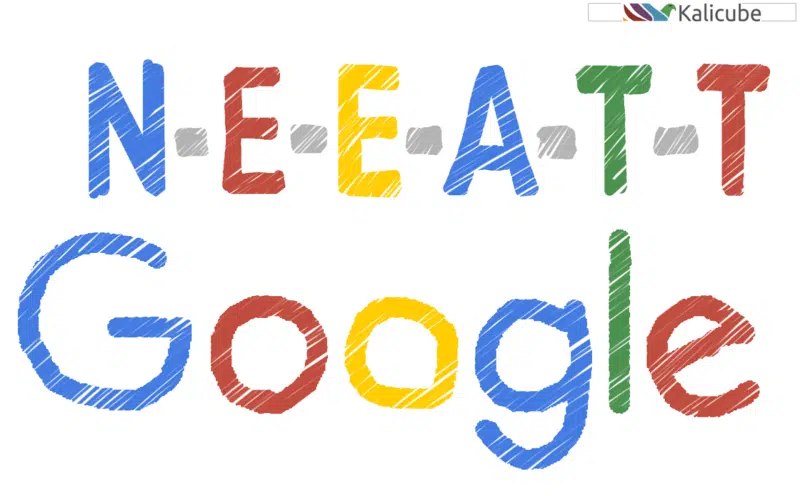
Notability is a huge signal to Google
Warning: notability is only partially synonymous with fame. It also indicates the entity has enough impact in a particular field for a specific audience to warrant recognition.
Google’s approach to famousness is founded on a hyper-granular assessment of notability based on the topic, geographical location and the type of entity involved. This means that what constitutes notable can differ greatly depending on the entity type, the field (topic) and the geolocation.
Notability is incredibly specific to a niche (both for humans and Google). It’s about being front-of-mind and having a significant influence within a particular industry and location that justifies recognition from a certain audience.
The importance of notability in Google’s algorithms is demonstrated in the SERPs. For example, if several people with the same name have Knowledge Panels, it will show the Knowledge Panel of the one it perceives to be the most notable.
Additionally, data from Kalicube Pro indicates that getting a place in entity-driven SERP features such as People Also Ask, entity boxes or “best of” entity lists are heavily influenced by notability – generally speaking, a few notable entities will dominate a market.
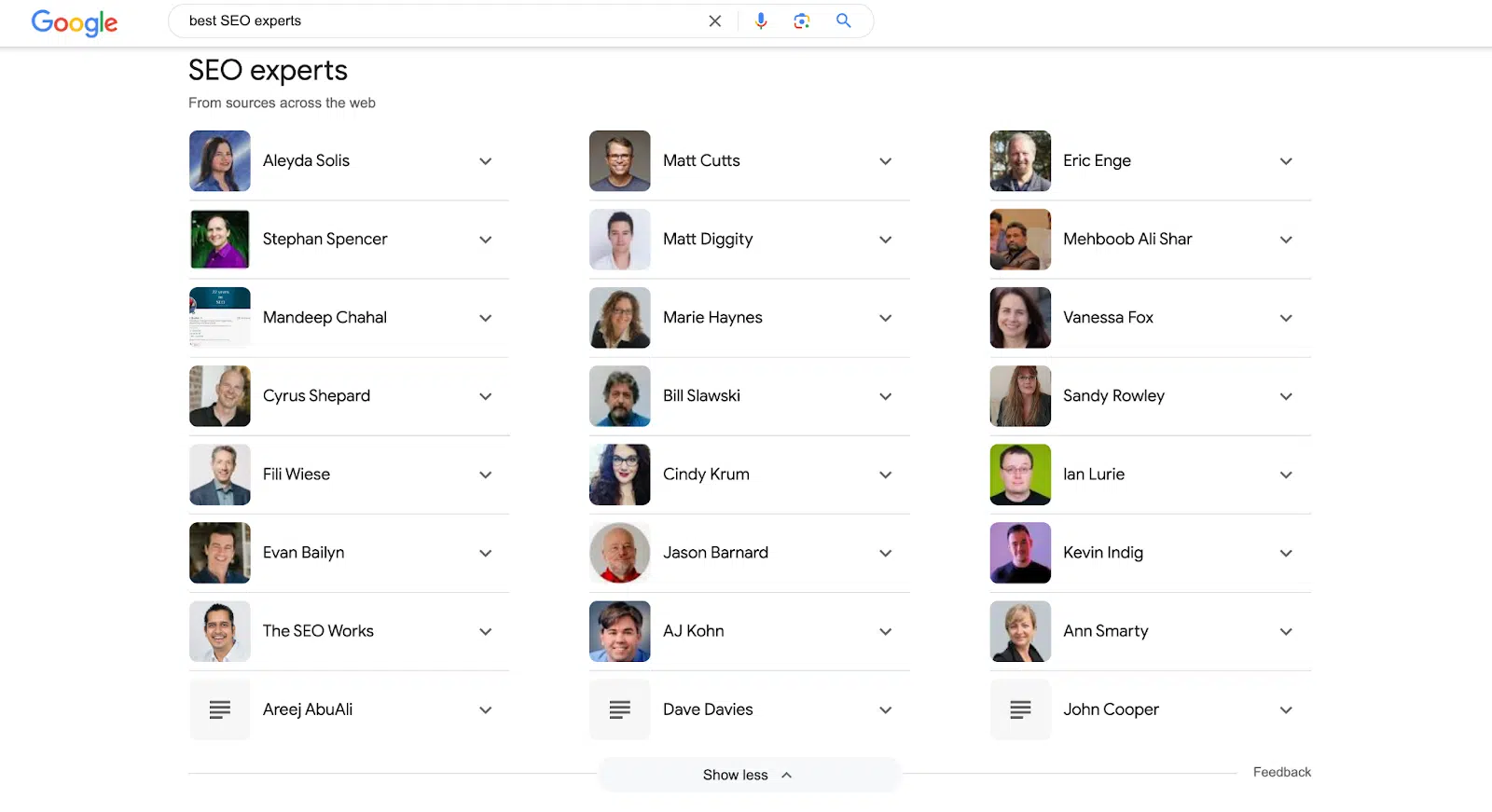
Building notability for N-E-E-A-T-T is traditional PR packaged for Google.
Much of the work we do for my company clients is to direct them to focus on the most relevant PR targets and ensure that the resulting press inches are easily digestible, understandable and meaningful for Google.
But Google is hyper-niche. A major publication has a broad reach and high authority but is not always the most helpful for establishing notability within a specific field due to its generalist nature.
A resource that is hyper-relevant topically and geographically will be more powerful. For notability and credibility signals more generally, always consider these three aspects:
- Topical relevance: Niche-specific resources will “make you famous” with the niche audience.
- Geographical relevance: Geo-specific resources are important whether you are local, national or international. A local entity (person or corporation) will gain niche notability when featured in geo-relevant publications. But then, so do entities with national or international aspirations. Every small piece contributes to the bigger picture.
- Audience alignment: A resource that aligns closely with your niche will have an audience deeply interested in your area of expertise. This means the audience is likelier to engage with and value the content, which signals notability.
As an example, in the world of digital marketing in Seattle, holding a position on the board of advisors for the SDMA (Seattle Digital Marketing Association) or being featured in a well-known marketing blog that focuses on the Pacific Northwest market would be clear indicators of high notability within that community.
Transparency is a huge signal to Google
Transparency in N-E-E-A-T-T is non-negotiable. Being transparent is a fundamental aspect of credibility and absolutely necessary for trust.
Being transparent means being open, clear and honest about who you are as a content creator or website owner.
Transparency greatly enhances how effectively your message is communicated and trusted by both humans and Google’s algorithms. Without being transparent about who you are, other N-E-E-A-T-T elements lose much of their meaning.
Google’s Quality Rater Guidelines are very explicit that their human evaluators should be looking for transparency from the website owner or publisher. And remember that Google is building algorithms that mirror human judgment when assessing credibility.
Transparency for both people and Google starts with a clear, helpful and informative About Us page.
This is where they can find out who the website owner is. This page is the absolute minimum for transparency for your audience and Google, so start there.
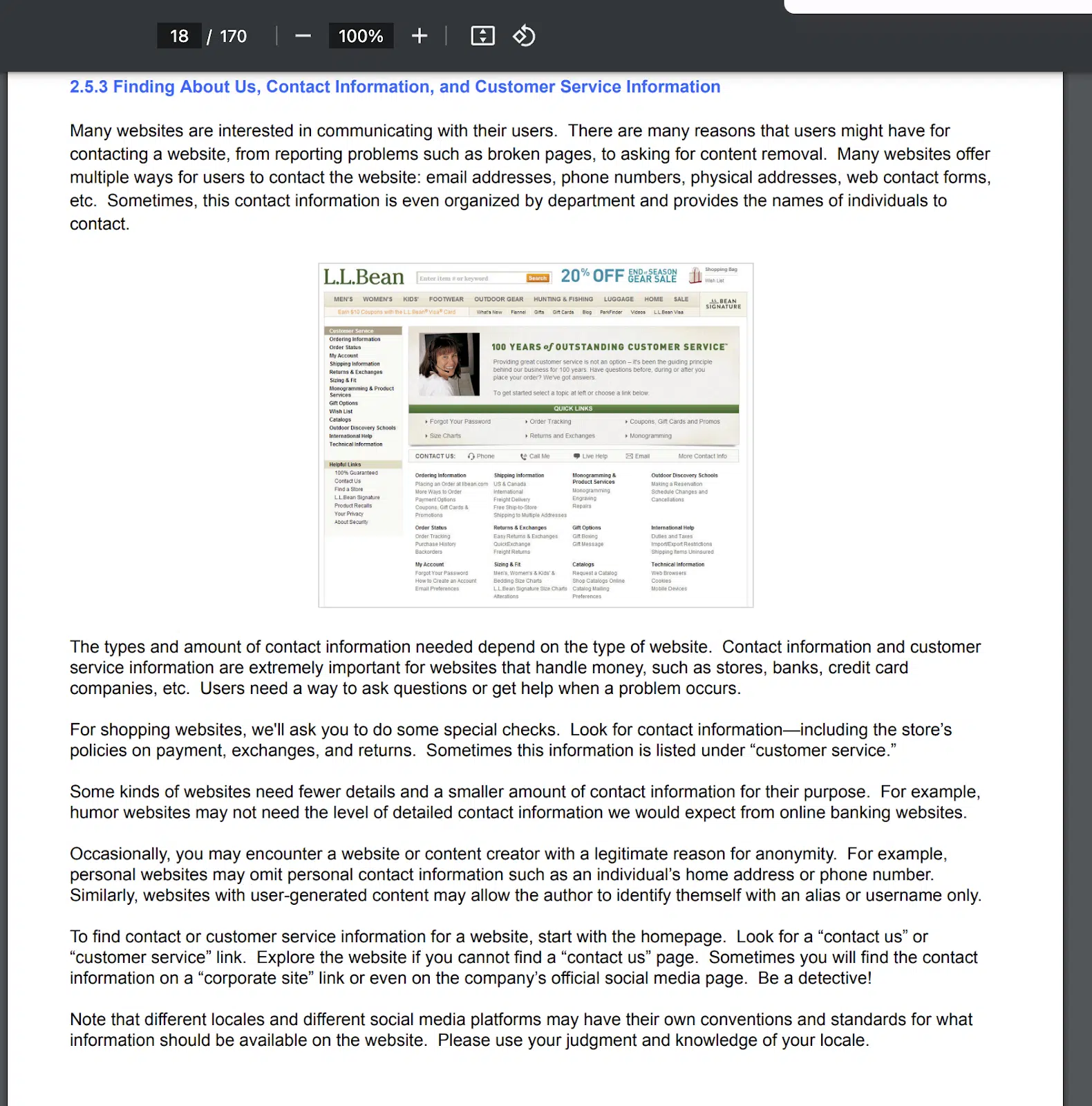
An About page for the content creators makes sense, too, so visitors can learn more about them, their credentials and why they should be trusted as a source or solution provider.
Transparency starts on your About page and extends to every platform where your audience meets your brand.
Transparency from top to bottom, across the board, is essential to your relationship with your audience (who are your ultimate target) and with Google (which is simply an interface between you and your audience).
(I’d like to thank Jarno Van Driel for encouraging me to take transparency more seriously.)
Without explicit understanding, N-E-E-A-T-T means nothing
Without an explicit understanding of the website owner and the content creator, Google cannot evaluate credibility in the form of notability, experience, expertise, authority, trustworthiness and transparency.
Google has long been evaluating credibility using links to a webpage. Still, with an explicit understanding of the website owner and the content creator, Google can apply a huge range of additional N-E-E-A-T-T signals such as awards, qualifications, previous work, reviews, peer approval and more.
From strings to things is now a reality. N-E-E-A-T-T credibility is founded on Google’s understanding of things (your things), so focus on getting your website owner and content creator entities into Google’s Knowledge Graph.
You can use your Knowledge Panel as your KPI.
Putting Google to one side
As a company, a CEO, a founder, an author, an expert or a consultant, you want to prove that you are a voice of authority people can trust by building and demonstrating notability, experience, expertise, authoritativeness and trustworthiness transparently. If you do this successfully, then you’ve won the game with your human audience.
The next step is to package your voice of authority that people can trust as N-E-E-A-T-T for search engines. Google will pick up on some signals and miss others.
How much does Google’s ability to digest and believe your trust and credibility matter?
If your human audience trusts you today, you are already achieving your business or professional goals in the short term.
Google is a mid to long-term bonus if you can effectively package these legitimate audience-facing signals, then you can become Google’s preferred reference in your field.
You’ll then become a major part of its conversations with the subset of its users, who are your audience in search today and generative AI tomorrow.
Short, mid and long-term SEO is simply making sure you are Google’s go-to recommended solution for the subset of its users who are your ideal audience.
Contributing authors are invited to create content for Search Engine Land and are chosen for their expertise and contribution to the search community. Our contributors work under the oversight of the editorial staff and contributions are checked for quality and relevance to our readers. The opinions they express are their own.
Related stories
New on Search Engine Land